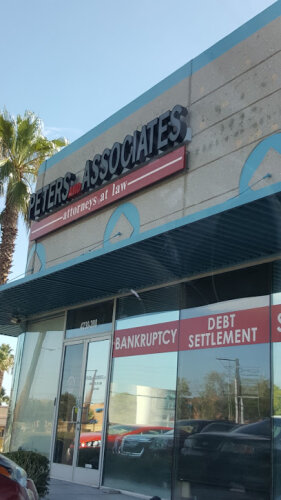Best Professional Malpractice Lawyers in Las Vegas
Share your needs with us, get contacted by law firms.
Free. Takes 2 min.
List of the best lawyers in Las Vegas, United States
About Professional Malpractice Law in Las Vegas, United States
Professional malpractice refers to legal claims that arise when a licensed professional fails to provide the level of care, competence, or skill ordinarily expected of members of that profession, and that failure causes harm. In Las Vegas, as elsewhere in Nevada, professional malpractice commonly involves medical professionals, attorneys, accountants, architects, engineers, and other licensed service providers. Malpractice claims are civil actions seeking compensation for harm caused by negligent or wrongful professional conduct, and they operate alongside separate administrative processes such as licensing-board investigations and complaints.
Understanding professional malpractice in Las Vegas means understanding both general tort principles - duty, breach, causation, and damages - and Nevada-specific rules that affect timing, proof, available remedies, and interactions with licensing and insurance systems. If you believe you have been harmed by a professional in Las Vegas, it is important to move carefully to preserve evidence, meet procedural deadlines, and evaluate the strengths and weaknesses of a potential claim.
Why You May Need a Lawyer
Professional malpractice cases can be legally complex and factually technical. You may need a lawyer if you are facing any of the following situations:
- Serious injury, significant financial loss, or long-term harm that you believe resulted from a professional's actions or omissions.
- Difficulty proving what a competent professional in the same field would have done - many claims require expert testimony to explain standard of care and causation.
- A professional or their insurer is denying responsibility or offering a low settlement that does not cover your losses.
- You are unsure how the statute of limitations or discovery rules apply to your situation and worry about missing a filing deadline.
- Administrative or disciplinary proceedings have been opened against you by a licensing board, or you want to file a complaint against a professional with a licensing board.
- You need to preserve evidence, coordinate records from multiple providers, or obtain medical, financial, or technical experts.
An experienced malpractice attorney can evaluate whether you have a viable claim, identify the appropriate legal theory, help assemble expert evidence, preserve critical documents, negotiate with insurers, and represent you in court or in settlement negotiations.
Local Laws Overview
Several key legal themes and local rules are especially relevant for professional malpractice claims in Las Vegas and Nevada generally:
- Standard of Care - Malpractice claims hinge on whether the professional breached the accepted standard of care for their profession. Establishing that standard and proving a breach typically requires testimony from qualified experts who practice in the same field.
- Causation and Damages - Plaintiffs must show that the professional's breach was a proximate cause of the injury or loss and quantify damages. Damages commonly include economic losses such as medical bills and lost income, non-economic losses such as pain and suffering, and, in rare cases, punitive damages when misconduct was willful or malicious.
- Statute of Limitations and Discovery Rule - Nevada imposes time limits on filing malpractice lawsuits. The applicable deadline depends on the type of professional claim and the facts of the case, particularly when the injury was discovered or reasonably should have been discovered. These timing rules can be complex and may be tolled or extended in certain circumstances, so prompt consultation is important.
- Expert Evidence and Pre-suit Requirements - Many professional malpractice claims require expert opinion to establish negligence and causation. Some types of claims may have procedural pre-suit steps, such as an early expert affidavit or notice requirements, depending on the area of law and recent local rules.
- Comparative Fault - Nevada reduces a plaintiff's recovery to reflect the plaintiff's own share of fault when applicable. That means a plaintiff may still recover damages even if partially responsible, but the award will be adjusted accordingly.
- Licensing Board Processes - Administrative complaints and disciplinary actions against licensed professionals are handled by state licensing boards. Those proceedings are separate from civil malpractice litigation and may have different standards, remedies, and timelines.
- Insurance and Limits - Many professionals carry malpractice insurance that shapes settlement negotiations and outcomes. The presence of insurance can make it easier to collect a recovery but can also lead to aggressive defense strategies by insurers.
Frequently Asked Questions
What counts as professional malpractice in Las Vegas?
Professional malpractice occurs when a licensed professional fails to meet the accepted standard of care for their field, and that failure causes harm. Examples include surgical errors by a doctor, an attorney missing a critical filing deadline that harms a client, or an accountant making negligent errors that result in significant financial loss.
How do I know if I have a valid malpractice claim?
To evaluate a claim you generally must show: a duty existed between you and the professional; the professional breached the applicable standard of care; the breach caused your injury; and you suffered damages as a result. A qualified attorney can review your records and often consult with an expert to determine whether your situation may meet these elements.
How long do I have to file a malpractice lawsuit in Nevada?
Time limits vary by claim type and circumstances. Many malpractice claims must be filed within a relatively short period after the injury or after the injury should have been discovered. Discovery rules, tolling, and other exceptions can affect deadlines. Because missing the deadline can bar your claim, consult an attorney promptly to determine the applicable time limit for your case.
Do malpractice claims require expert testimony?
In most professional malpractice cases, especially medical malpractice, expert opinion is essential to establish the standard of care and causation. Experts explain what a competent professional would have done and whether the defendant fell short. The specifics vary by profession and case complexity.
Can I file a complaint with a licensing board and still file a civil lawsuit?
Yes. Licensing-board complaints and civil lawsuits are separate processes. Filing a complaint with a state board may lead to disciplinary action such as license suspension or reprimand, but it does not replace or preclude a civil claim for damages. Conversely, a licensing board's action may provide useful evidence in a civil case, but boards use different standards and remedies.
How much is my case worth?
Case value depends on the extent of economic damages like medical costs and lost wages, non-economic damages such as pain and suffering, and any potential punitive damages in extraordinary cases. The strength of evidence, degree of fault, expert testimony, and defendant insurance limits all influence potential recovery. An attorney can help estimate value after reviewing your records and obtaining expert opinions.
What will it cost to hire a malpractice lawyer?
Many malpractice attorneys work on a contingency-fee basis for civil claims, meaning they are paid a percentage of any recovery and may advance case expenses. If there is no recovery, you typically do not pay attorney fees, although you may still be responsible for certain case costs depending on your agreement. Fee structures vary, so review the engagement letter carefully.
How long does a malpractice case take to resolve?
Timelines vary widely. Some cases settle in months, while others require years if they proceed to trial. Factors influencing duration include the complexity of medical or technical issues, the number of parties, court schedules, discovery needs, and settlement negotiations. Your attorney can give a more specific timeline based on the facts of your case.
What if I was partly at fault for my injury?
Nevada reduces a plaintiff's recovery by the plaintiff's share of fault. You may still recover damages even if you were partially responsible, but the award will be reduced in proportion to your percentage of fault. Comparative fault rules can be complicated when multiple parties are involved, so legal counsel is important.
Should I talk to the professional or their insurance company after the incident?
Exercise caution. Statements made to the professional or their insurer can be used during the claims process. It is advisable to consult an attorney before providing recorded statements or formal releases. You should, however, take practical steps such as seeking treatment, documenting your injuries and losses, and preserving records and communications.
Additional Resources
State licensing boards and government agencies can help with regulatory complaints and provide information about professional discipline and licensure:
- Nevada State Board of Medical Examiners
- Nevada State Board of Osteopathic Medicine
- Nevada State Board of Nursing
- State Bar of Nevada for attorney licensing and complaints
- Nevada Board of Accountancy for accounting professionals
- Nevada Division of Insurance for questions about malpractice insurance and claims handling
- Clark County District Court for filing and procedural information on civil cases
- Nevada Supreme Court and local court clerk offices for procedural rules and forms
- Legal aid organizations and pro bono clinics in Southern Nevada for low-cost consultations
These organizations can provide guidance on licensing complaints, public records about disciplinary history, court procedures, and resources for finding qualified attorneys or expert witnesses.
Next Steps
If you believe you have a professional malpractice matter in Las Vegas, consider the following practical steps:
- Preserve records and evidence. Secure all medical records, bills, contracts, emails, letters, invoices, photographs, and any other documentation related to the incident and damages.
- Seek qualified medical or professional treatment if needed and keep thorough records of treatment and expenses.
- Write down a careful timeline of events, names of involved professionals and witnesses, and any communications you had with the professional or their representatives.
- Contact an experienced malpractice attorney for an initial consultation. Many attorneys offer free or low-cost case evaluations and can advise on deadlines, evidence needs, and potential strategies.
- Ask about experts. A malpractice attorney will often consult or retain an expert early to assess causation and liability.
- File necessary complaints. If appropriate, file an administrative complaint with the relevant licensing board and understand how that process interacts with civil claims.
- Be mindful of deadlines. Confirm the statute of limitations and any pre-suit notice requirements that might apply to your claim so you do not lose the right to pursue damages.
- Consider settlement options. Many malpractice cases settle before trial. An attorney will negotiate with insurers or defendants to seek a fair resolution, while preserving the option to litigate if needed.
This guide is informational and not a substitute for legal advice. For specific legal guidance tailored to your situation, consult a licensed attorney who handles professional malpractice in Nevada.
Lawzana helps you find the best lawyers and law firms in Las Vegas through a curated and pre-screened list of qualified legal professionals. Our platform offers rankings and detailed profiles of attorneys and law firms, allowing you to compare based on practice areas, including Professional Malpractice, experience, and client feedback.
Each profile includes a description of the firm's areas of practice, client reviews, team members and partners, year of establishment, spoken languages, office locations, contact information, social media presence, and any published articles or resources. Most firms on our platform speak English and are experienced in both local and international legal matters.
Get a quote from top-rated law firms in Las Vegas, United States — quickly, securely, and without unnecessary hassle.
Disclaimer:
The information provided on this page is for general informational purposes only and does not constitute legal advice. While we strive to ensure the accuracy and relevance of the content, legal information may change over time, and interpretations of the law can vary. You should always consult with a qualified legal professional for advice specific to your situation.
We disclaim all liability for actions taken or not taken based on the content of this page. If you believe any information is incorrect or outdated, please contact us, and we will review and update it where appropriate.









